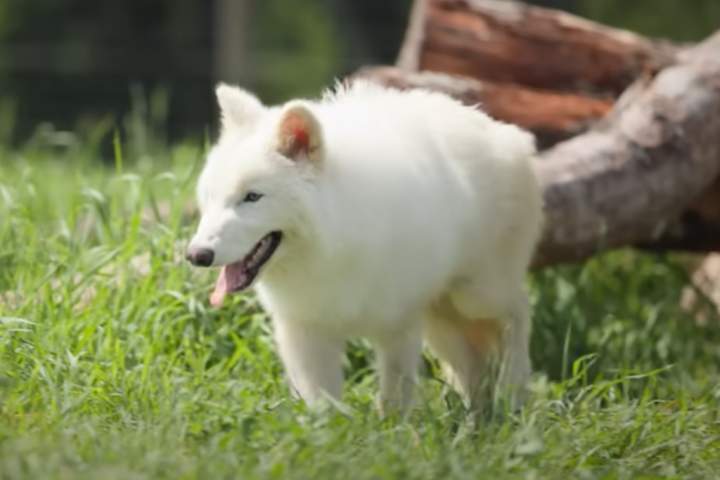Science
Colossal Biosciences Unveils First Playdate of ‘Dire Wolves’

Colossal Biosciences has introduced its genetically engineered ‘dire wolves’ to one another for the first time, marking a significant milestone in the company’s ambitious project. This event unfolded at a private nature preserve where the three wolves, two males named Romulus and Remus, and a female named Khaleesi, were observed interacting. The company announced the birth of these animals in April 2023, following a groundbreaking approach that involved using DNA from two ancient fossils alongside genetic modifications from grey wolves.
During the playdate, which was captured in a video shared on the company’s YouTube channel, Khaleesi was introduced to her brothers separately. The interaction began with Romulus entering a grassy area where Khaleesi quickly engaged in playful behavior, demonstrating a level of comfort and curiosity as she crawled under a stack of logs while being chased. A handler from Colossal noted, “Everybody was showing great behaviours and ended up being comfortable.” This interaction showcased not only the siblings’ playful nature but also Khaleesi’s ability to navigate the dynamics with her larger brother.
After the initial introduction, Remus was brought into the area, allowing Khaleesi to meet him as well. The handler remarked on the excitement of the moment, observing that “remus is almost more gentle than Romulus.” They noted that the siblings exhibited a range of play behaviors, including wagging their tails and maintaining a relaxed stance. The team is closely monitoring the interactions, with plans to eventually introduce all three wolves together when Khaleesi shows more confidence and control.
The trio is currently being raised in a nature preserve that spans over 2,000 acres, secured with 10-foot-tall fencing and enhanced surveillance measures, including live camera feeds and drone tracking. This extensive setup aims to ensure the wolves’ safety and welfare. Within the preserve, there is a dedicated six-acre area designed for close observation and care, which includes a veterinary clinic and facilities for wolf management.
While the project has garnered attention for its innovative approach, it has also faced criticism. Experts like Corey Bradshaw, a professor of global ecology at Flinders University, have expressed skepticism about the classification of these animals as dire wolves, stating, “Those slight modifications seemed to have been derived from retrieved dire wolf material. Does that make it a dire wolf? No.” Similarly, Dolf DeJong, CEO of the Toronto Zoo, described the endeavor as “living clickbait,” raising concerns about the ethical implications of creating genetically modified animals for commercial purposes.
The project received a notable boost in visibility when filmmaker Peter Jackson and Game of Thrones creator George R.R. Martin collaborated with Colossal Biosciences, lending the company the iconic Iron Throne prop from the series to promote the wolves. Martin remarked, “Many people view dire wolves as mythical creatures that only exist in a fantasy world, but in reality, they have a rich history of contributing to the American ecosystem.”
As Colossal Biosciences continues its work in genetic engineering, the implications of their efforts reach beyond scientific curiosity, touching on ethical debates and the responsibilities that come with reviving extinct species. The interaction of Romulus, Remus, and Khaleesi serves as a reminder of both the potential and the challenges inherent in such groundbreaking initiatives. The company remains committed to the welfare of these animals, ensuring that their physical and mental health is a priority as they navigate the complexities of this ambitious project.
-

 Politics4 weeks ago
Politics4 weeks agoSecwepemc First Nation Seeks Aboriginal Title Over Kamloops Area
-

 World5 months ago
World5 months agoScientists Unearth Ancient Antarctic Ice to Unlock Climate Secrets
-

 Entertainment5 months ago
Entertainment5 months agoTrump and McCormick to Announce $70 Billion Energy Investments
-

 Science5 months ago
Science5 months agoFour Astronauts Return to Earth After International Space Station Mission
-

 Lifestyle5 months ago
Lifestyle5 months agoTransLink Launches Food Truck Program to Boost Revenue in Vancouver
-

 Technology3 months ago
Technology3 months agoApple Notes Enhances Functionality with Markdown Support in macOS 26
-

 Lifestyle3 months ago
Lifestyle3 months agoManitoba’s Burger Champion Shines Again Amid Dining Innovations
-

 Top Stories2 months ago
Top Stories2 months agoUrgent Update: Fatal Crash on Highway 99 Claims Life of Pitt Meadows Man
-

 Politics4 months ago
Politics4 months agoUkrainian Tennis Star Elina Svitolina Faces Death Threats Online
-

 Sports5 months ago
Sports5 months agoSearch Underway for Missing Hunter Amid Hokkaido Bear Emergency
-

 Politics5 months ago
Politics5 months agoCarney Engages First Nations Leaders at Development Law Summit
-

 Technology5 months ago
Technology5 months agoFrosthaven Launches Early Access on July 31, 2025





















